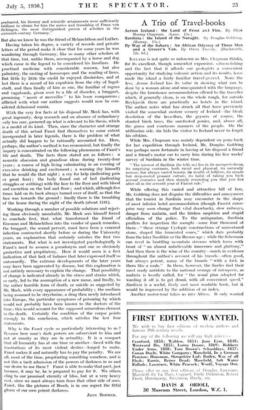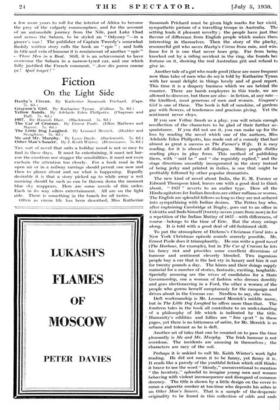A Trio of Travel-books Sardinia : the Island of the
Nuraghi. Ily Douglas Goldring. (Harrap. 15s.) Icr.Latin is not quite so unknown as Mrs. Chipman thinks, for its excellent, though somewhat expensive, sAhnon-lishing and the fact that it affords our geologists a convenient opportunity for studying volcanic action and its results, have made the island a fairly familiar travel-ground. None the less, Across Iceland has its value in showing what can be done by a woman alone and unacquainted with the language, despite the farmhouse accommodation offered to the traveller which, if generally clean, is on the whole rough, for outside Reykjavik there are practically no hotels in the island. The author notes what has struck all that have previously visited the somewhat austere scenery of Iceland—the bleak desolation of the lava-floes, the geysers of course, the stunted birch trees, the surefooted ponies, and, above all, the grave and courteous manners of the people. On the utilitarian side, she bids the visitor to Iceland never to forget his oilskins.
‘Vhile Mrs. Chapman was mainly dependent on pony-back for her expedition through Iceland, Mr. Douglas Goldring was perhaps more fortunate in having at his disposal it friend and a friend's motor car to carry him during his five weeks' survey of Sardinia in the winter time.
" The interest of Sardinia (he tells us) lies in its unexpectedness, its surprising contrasts, both racial and physical, its naturally morose, but always varied beauty, its wealth of folklore, its simple but deep-rooted peasant culture, its habit of taking you back several centuries and then sharply reminding you that you live .after all in the seventh year of Fascist rule."
While offering this varied and attractive bill of fare, Mr. Goldring does not disguise the difficulties and annoyances that the tourist in Sardinia may encounter in the shape of most inferior hotel accommodation (though Fascist enter- prise may soon change that vital drawback), slow railways, danger from malaria, and the tireless suspicion and stupid officialism of the police. To the antiquarian, Sardinia proffers for inspection the nuraghi—some four thousand of them—" these strange Cyclopie constructions of unmortared stone, shaped like truncated cones," which date probably from the later Neolithic or the Bronze age ; while the fisherman can revel in brattling mountain streams which teem with trout of " an almost unbelievable innocence and gluttony." And then there is the wine of the country—much in evidence throughout the author's account of his travels—often good, but always potent, many of the brands " with a kick in them like a mule." In them, however, the Sardes find their most ready antidote to the national scourge of inlemperie, as malaria is lucidly called, for " the usual plan adopted for warding it off is to get drunk with all convenient speed." Sardinia is a useful, lively and most readable book, but it would be improved by the addition of an index.
Another motor-tour takes us into Africa. It only wanted
a few more years to roll for the interior of Africa to become the prey of the vulgarly commonplace, and for the account of an automobile journey from the Nile, past Lake Chad and across the Sahara, to be styled an " Odyssey "—in a grocer's van ! The publisher of Captain Tweedy's somewhat flashily written story calls the book an " epic " ; and both in title and vein of humour it is reminiscent of another "epic" —Three Men in a Boat. Still, it is an achievement to have overcome the Sahara in a narrow-tyred car, and one which fully justified the French comment, " Avec des pneus comme
! Quel toupct ! "











































 Previous page
Previous page